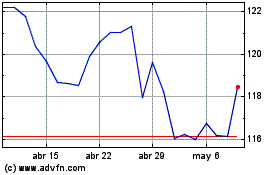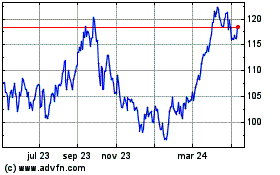Imperial Oil Rolls Back U.S.-Bound Exports, Citing Surge in Cost
01 Febrero 2019 - 8:05PM
Noticias Dow Jones
By Vipal Monga
Exxon Mobil Corp.'s Canadian unit Imperial Oil Ltd. is scaling
back the amount of U.S.-bound oil it ships by rail from the
province of Alberta to nearly zero this month.
The company shipped an average of roughly 90,000 barrels a day
by rail to U.S. refineries in January, Imperial Chief Executive
Richard Kruger said during a conference call Friday. A recent surge
in the price of western Canadian heavy crude -- fueled by an
Alberta-mandated production cut unveiled in December -- means it
has become too expensive to ship that oil on trains, Mr. Kruger
said.
The move represents about 2% of the 3.54 million daily average
barrels Canada exported to the U.S. for the week ending Jan. 25,
according to data from the U.S. Energy Information
Administration.
According to a transcript of the call, Mr. Kruger said the
decision to largely halt the crude-by-rail shipments is "a very
tangible example of what we believe is ill-advised, ill-informed
negative consequence of this curtailment order."
Moving a barrel from terminals in Alberta to the U.S. Gulf Coast
costs Imperial between $15 and $20 by rail, Mr. Kruger said. That
price tag exceeds the premium of U.S. crude to Canadian, which was
at $9.95 a barrel earlier this week, according to S&P Global
Platts. That puts shippers at risk of missing out on profits even
after Canadian prices rose.
In October, the discount on western Canadian crude relative to
the U.S. benchmark hit a decade high of more than $50 a barrel.
In response to rising inventories in the province, created by
limited pipeline capacity, the government of oil-rich Alberta cut
local crude production by 8.75%, or the equivalent of 325,000
barrels a day.
Since the output cut was unveiled, the benchmark price for a
barrel of western Canadian crude climbed to $46 this week from
$22.
Canada is the fourth-largest oil producer in the world, with the
bulk of output in Alberta. Alberta's move to cut production was
criticized by
large oil producers in the province, such as Imperial and Suncor Energy Inc., as an unwarranted interference in free markets.
Imperial's decision is "absolutely a big deal," said Mike Walls,
an analyst with data firm Genscape. He added the move will cause
the inventory drawdown in Alberta to slow, and put downward
pressure on western Canadian crude prices.
Imperial's announcement comes as demand for heavy crude is
increasing in the Gulf Coast. The U.S. government's decision to
sanction Venezuela's oil producer Petróleos de Venezuela SA, or
PdVSA, is expected to deplete the supply of those crude grades.
Alberta Premier Rachel Notley said this week her government
would allow slightly more production in February and March, the
equivalent of 75,000 a barrels a day, because of the runup in the
price of western Canada crude.
Mr. Walls said Imperial's announcement effectively neutralizes
Alberta's announcement this week.
Write to Vipal Monga at vipal.monga@wsj.com
(END) Dow Jones Newswires
February 01, 2019 20:50 ET (01:50 GMT)
Copyright (c) 2019 Dow Jones & Company, Inc.
Exxon Mobil (NYSE:XOM)
Gráfica de Acción Histórica
De Mar 2024 a Abr 2024

Exxon Mobil (NYSE:XOM)
Gráfica de Acción Histórica
De Abr 2023 a Abr 2024
